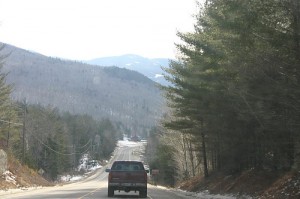Background
This page is no longer being updated. For ongoing coverage of this topic, go to New Hampshire Public Radio.
______
Among New Hampshire’s regions, the heavily forested North Country stands out as the most economically challenged. Employment and wages have been in decline over the decades as the North Country’s traditional industries — paper mills and other wood products manufacturing — have largely collapsed.
The term “North Country” itself is a bit nebulous. Large swaths of northern New Hampshire are poor and sparsely populated, which translates to a small tax base. So these areas often depend on funding from federal agencies for transportation, telecommunication, and other development projects. For their purposes, some federal agencies go so far as to label two-thirds of New Hampshire “North Country.” But most economic development groups — and New Hampshirites — define the region as the northern third of the state comprising Coos County to the far north and portions of Grafton and Carroll Counties.
Economically, there are some big differences between these places.
Grafton County is by far the best off economically, as the home of both Dartmouth University and Dartmouth-Hitchcock Medical Center. Figures from the U.S. Census Bureau show only 2.6 percent unemployment in the area. Fifty-two percent of workers there make $50,000 or more a year.
Meanwhile, for more than a hundred years, Carroll County has billed itself as the go-to place for White Mountains tourism. The Census Bureau reports about one out of five people work in the service industry, while a quarter of residents are in sales and office positions. Like Grafton County, more than half of Carroll County residents make $50,000 or more annually.
Coos County, on the other hand, is the part of the North Country facing the most economic challenges. There, the unemployment rate is still relatively low, at 3.5 percent. But countywide, 41 percent of people make less than $35,000 a year. In response, the North Country Council, which distributes federal economic aid, has pumped more cash into Coos County than any other part of the region. Over 40 years, the county’s largest city, Berlin, got more than $10 million in development funds, compared to roughly $9 million throughout the North Country as a whole.
But bringing more employment and economic development opportunities to the North Country is a complex issue. Its signature forests are a patchwork of federal, state and private lands, which can make navigating legal and regulatory requirements difficult. And small-scale farmers, foresters, and biomass plants aren’t always happy with the prospect of large companies changing the area’s character — or competing for business.











